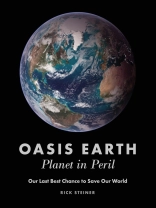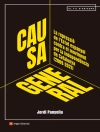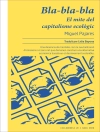Oasis Earth confirms that we are destroying the biosphere of our Home Planet. We know the causes, consequences, and solutions to this existential crisis, yet we’ve failed to correct it. We are out of time: this decade is our last best chance to save a habitable Earth. Rich with insights from those who have viewed our planet from space and evocative images from the U.N. Environment Program’s international photographic competitions, NASA, Greenpeace and others, Oasis Earth weaves a journey through the extraordinary diversity of life on Earth, the interrelated causes of global ecological collapse, and the path to a livable future.
Tabla de materias
I. Introduction
II. Paradise: Our Living Planet
III. Paradise Lost: Global Ecological Collapse
IV. Paradise Restored: Solutions for Sustainability
V. Conclusion: From Anthropocene to Ecocene
Sobre el autor
Rick Steiner is a conservation biologist in Anchorage Alaska (U.S.), and has been involved in the global conservation movement for over 40 years. From 1980-2010 he was a marine conservation professor with the University of Alaska, stationed in the Arctic, Prince William Sound, and Anchorage, specializing in marine conservation, and worked on environmental effects of offshore oil, climate change, fisheries, marine mammals, habitat conservation, and conservation policy. After the university and U.S. government pressured him to restrain from raising concerns about the risks and impacts of offshore oil development, he resigned his tenured professorship in protest. He has authored over one hundred publications; written commentaries for many national and international media outlets including USA Today, L.A. Times, The Guardian, and Huffington Post; and worked around the world with governments, the United Nations Environment Program (UNEP), the International Union for the Conservation of Nature (IUCN), and many Indigenous People’s and non-governmental organizations in diverse regions including Nigeria, Papua New Guinea, Russia, Pakistan, China, the Middle East, the South Pacific, Australia, the Arctic, Kazakhstan, and El Salvador. He has received several conservation awards, and The Guardian called him ‘one of the world’s leading marine conservation scientists, ‘ and ‘one of the most respected and outspoken academics on the oil industry’s environmental record.’ He serves on the Board of Directors of Public Employees for Environmental Responsibility, and the Board of Advisors of The Ocean Foundation. He has delivered Oasis Earth: Planet in Peril as a public presentation for over 30 years, in many venues around the world.











